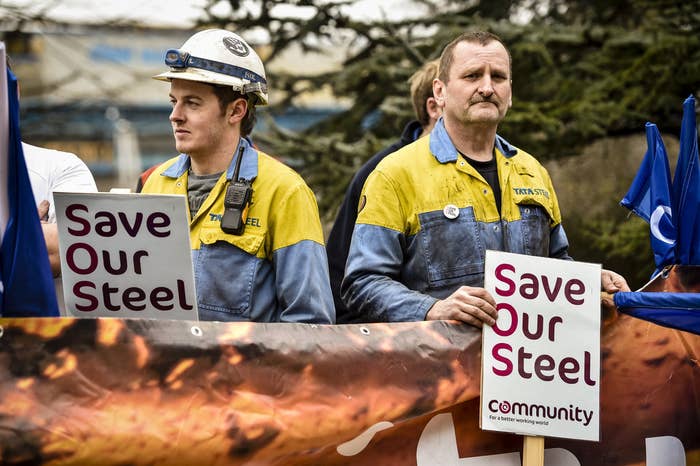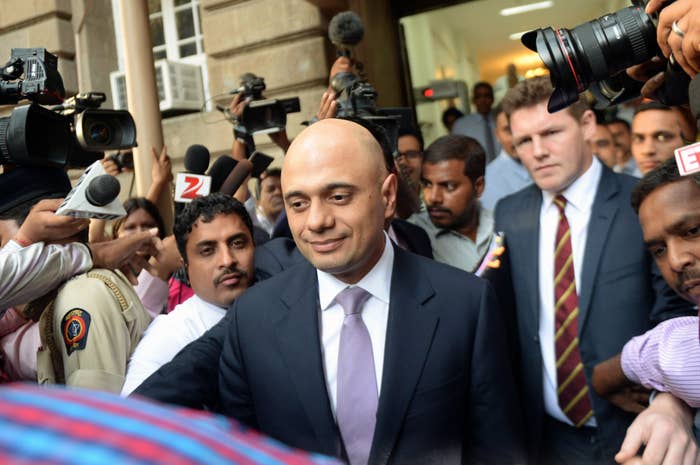
The government has laid out its plans for the future of the steel industry, including the revelation that it is willing to buy a 25% stake in Tata Steel’s UK operations.
Business secretary Sajid Javid had previously ruled out nationalisation, saying only that he was willing to “co-invest” on “commercial terms” and did not want to breach EU rules on state aid handouts.
However, on Thursday he said that under EU rules, the government is able to part-nationalise the industry with a stake of up to 25%.
He said the government is also willing to lend hundreds of millions of pounds, either as a standard loan, to be repaid over a certain period; a hybrid loan, which means the debt could be swapped for a stake in the business at a later date; or an outright investment that would leave the government with a stake.
Javid also revealed he had made another trip to Mumbai to discuss strategies with the chair of Tata. According to sources, around 50 potential suitors – out of 190 approached by Tata – have already noted their formal interest in the business, which includes the Port Talbot steelworks in south Wales.
Among the possibilities is a possible management buyout that could see each worker stump up £10,000.

The government position is at odds with previous statements from Javid saying nationalisation would not be suitable.
He said last week: “The way forward has to be a commercial operator. That’s how the best steel companies in the world are being run and that’s how we want to see British steel companies being run too.”
The government will continue to look at how new owners can avoid taking over Tata's onerous pension fund – including the £450 million deficit.
Other issues still to be resolved include whether the government should offer further reductions to various taxes, such as green levies, and cuts to business rates.
BuzzFeed News has previously calculated that it could cost the government as much as £2 billion to successfully sell and maintain the steel industry.
However, on Thursday some free-market think tanks warned that the issues within the industry are structural, and said the blast furnace used at Port Talbot should be closed and focus shifted to other areas of steelmaking.

Ben Southwood, head of research at the Adam Smith Institute, said: “Stepping in to part-nationalise Port Talbot and other Tata Steel operations in the UK, as well providing hundreds of millions of pounds of debt finance, will make Britain poorer in the long run and keep steelworkers dependent on state aid for the foreseeable future.
“If no buyer has approached at the market price, this means that the people who know the steel industry best have judged that Britain's steel sector is not viable in the long run.”
He added: “Sweetening the deal with government guarantees could mean permanently propping up an unproductive industry when the world is moving away from the sort of blast furnace steel production that Port Talbot has.”
Mark Littlewood, director general at the Institute of Economic Affairs, said: “Unfortunately the problems of UK steel are structural, not cyclical. … Instead of throwing money at the problem, the government should focus on how to reduce the cost of government policies that harm the steel industry.”
The Labour party and unions welcomed the news, saying thousands of jobs could be saved by the deal, but they said the pressure on the government to deliver must remain.
Angela Eagle MP, the shadow business secretary, said: "The government must ensure Tata allow enough time for a suitable buyer to be found and they must reassure the customer base and supply chain.
"Crucially, they need to address the underlying challenges facing the industry; energy costs, business rates, procurement, and most of all, the illegal dumping of Chinese steel. Labour has developed a four-point plan to save the steel industry.”
Tony Burke, assistant general secretary of the union Unite, said: “Today’s announcement though is only part of the solution. The task now is to secure a buyer who is committed to purchasing the whole of Tata Steel UK and securing the long term future of steel making in the UK.”
